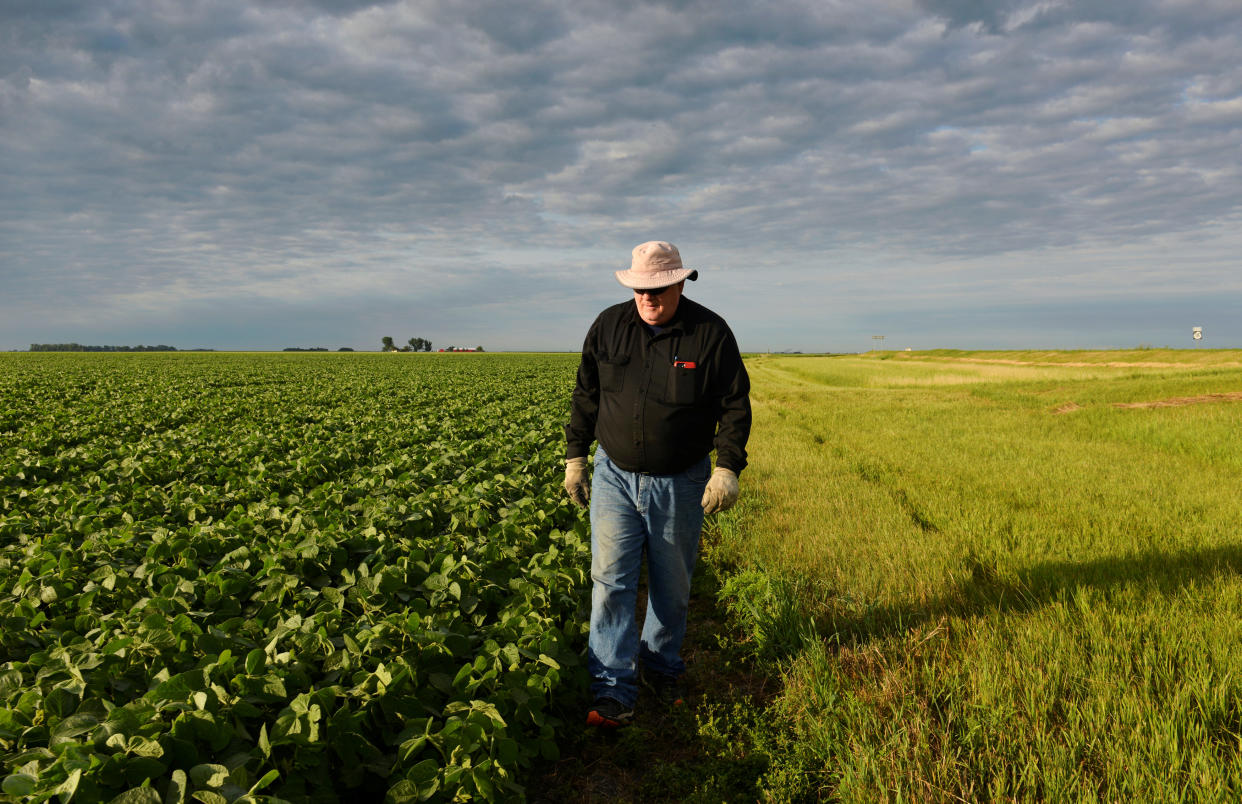Clear evidence Trump's trade war is hitting U.S. farmers

New trade data provides tangible evidence that some elements of President Trump’s trade wars are backfiring.
Prices for agricultural exports fell 5.3% in July, the biggest drop since 2011. The price of soybeans fell 14.1%, accounting for most of the overall drop. There were also small declines in the price of corn, wheat, fruit and nut exports. Overall export prices fell 0.5%, the biggest drop in more than a year, with agriculture causing most of the decline.
Beginning July 6, China imposed 25% tariffs on a variety of American agricultural products, including soybeans, corn, poultry and pork. Tariffs are a tax that instantly raise the cost of the targeted product, so $100 of soybeans would cost $125 with China’s 25% tariff. The tariffs have led some purchasers in China to cancel orders for U.S. agricultural products and seek cheaper commodities from other nations not subject to the new tariffs. Diminished demand pushes down prices and lowers farmers’ incomes.
Trump, of course, has said that “trade wars are good, and easy to win.” But nobody’s winning, so far. There’s some evidence that the Trump trade wars are rattling Chinese leaders and taking a toll on economic growth in China. But the same thing is happening here. All told, Trump has imposed new tariffs on about $107 billion of worth of imports this year. Trading partners have retaliated with tariffs on about $74 billion worth of US exports. And Trump has promised much more, threatening to hit another $608 billion worth of imports with tariffs. Other countries would most likely retaliate further.
[Check out our Trump trade war scorecard.]

Economists don’t think the Trump trade wars are severe enough yet to cause serious harm to the broader US economy. But export numbers back up anecdotal reports of the economic pain borne by farmers and select businesses directly affected by the tariffs. Victims include soybean farmers, dairy farmers, fisherman and the nation’s biggest producer of nails. Trump is also feuding with motorcycle maker Harley-Davidson, urging riders to boycott the firm over its plan to move export production overseas to avoid the Trump trade wars.
‘Trade aid is not is not going to make them whole’
Trump has pledged $12 billion in aid for farmers who lose overseas business. But the administration hasn’t yet spelled out who will get what, and farmers worry about long-term disruptions to valuable business relationships. “Farmers welcome the aid, but would very much prefer the original markets to sell their products into,” says Michael Nepveux, an economist with the Farm Bureau, the trade association for farmers and ranchers. “Trade aid is not is not going to make them whole.”
Some of the plunge in farm prices, and soybeans in particular, is probably because of banner crops this year and growing supply. “We’re expecting a large soybean crop this year,” says Nepveux, but the price drop is “definitely related to China tariffs.” The impact will become clearer in early September, when the Census Bureau releases the dollar value of imports and exports for July. “We will probably see a drop in soybean volumes,” Nepveux predicts.

Beyond the immediate impact on their finances, farmers worry that prolonged trade wars could draw producers in other nations into markets such as soybeans, where the United States is currently the world’s top supplier. China, for instance, is now buying more soybeans from Brazil and Argentina in lieu of US product and is also trying to further develop its own home-grown industry. There’s also concern farmers in some Central Asian nations could switch from wheat to soybeans to take advantage of American farmers’ new vulnerability.
The problem will get more acute through the end of the year, as farmers unload the remainder of last year’s crop, harvest this year’s, and begin working with bankers on financing next year’s activity —which will be difficult if barriers to big foreign markets remain. Trump has an incentive to resolve his trade disputes by Election Day in November, since damage caused by tariffs could turn voters against Republicans when they head to the polls. But the Trump administration doesn’t even appear to be negotiating with China, suggesting more pain is coming.
Confidential tip line: rickjnewman@yahoo.com. Click here to get Rick’s stories by email.
Read more:
Rick Newman is the author of four books, including “Rebounders: How Winners Pivot from Setback to Success.” Follow him on Twitter: @rickjnewman
Follow Yahoo Finance on Facebook, Twitter, Instagram, and LinkedIn


